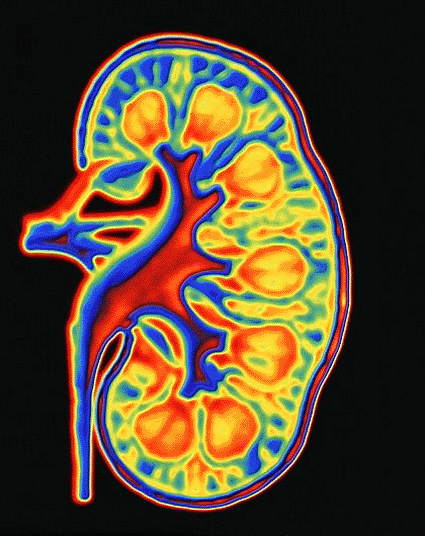Before Undergoing CT Scanning, Many Should Take Drug to Protect Kidneys
By MedImaging staff writers
Posted on 10 Mar 2008
Posted on 10 Mar 2008

Image: Colored computed tomography (CT) scan of a section through a whole healthy human kidney (Photo courtesy of Alfred Pasieka / SPL).
The inexpensive drug, called N-acetylcysteine, can prevent serious kidney damage that can be caused by the iodine-containing contrast media that clinicians use to enhance the quality of such scans. The contrast agent is typically given intravenously before a CT scan, angiogram, or other test. However, the new study demonstrates that taking an N-acetylcysteine tablet before receiving the contrast agent can protect patients, and that it works better than other medicines that have been proposed for the same purpose.
People whose kidneys are already vulnerable, including many older people and those with diabetes or heart failure, are the most at risk from contrast agents, and have the most to gain from taking the drug.
Researchers from the University of Michigan Health System (U-M; Ann Arbor, USA) performed the study, which was published in the February 19, 2008, issue of the Annals of Internal Medicine. The study involved a meta-analysis of data from 41 randomized controlled studies that evaluated various drugs for their kidney-protecting effects, and was led by Aine Kelly, M.D., M.S., an assistant professor in the department of radiology at the U-M Medical School.
Only N-acetylcysteine distinctly prevented contrast-induced nephropathy, the kidney damage caused by contrast agents. Theophylline, another drug that has been seen as a possible kidney-protecting agent, did not reduce risk significantly. Other drugs had no effect, and one, furosemide, increased kidney damage risk.
Mild to moderate kidney damage occurs in one in four high-risk individuals who undergo CT scanning, and in as many as one in 10 people with normal kidney function. In some cases, it causes acute kidney failure. "Millions of people receive contrast agents each year, including most heart patients who have angioplasties and stents, as well as those having a CT scan. Contrast agent helps [us] physicians see the things we need to see, but it also does pose a hazard to some people,” stated Dr. Kelly. "This drug, which is quick, convenient, inexpensive and widely available, with no major side effects, appears to be the best choice to protect those whose kidneys are most at risk.”
Although a prospective trial comparing N-acetylcysteine directly to other drugs should be conducted to validate the U-M group's findings, the team hopes its new study will help guide both clinicians and patients. In fact, according to Dr. Kelly, patients who know they have weakened kidneys also called impaired renal function should speak up when their doctor orders a CT scan, angiogram, or angioplasty, and make sure they get a tablet of N-acetylcysteine beforehand. Moreover, since most kidney problems cause no symptoms, even healthy people might want to ask their doctors to test their blood creatinine levels before sending them for a scan.
N-acetylcysteine is already widely used to clear mucus in cystic fibrosis patients, and to treat overdoses of acetaminophen. It is also being evaluated for other uses. Tablets of prescription-strength N-acetylcysteine are inexpensive: approximately US$0.25 for a 500-mg tablet and stocked by most pharmacies. It has few side effects. Over-the-counter supplement forms of the drug should not be used for pre-scan kidney protection.
Related Links:
University of Michigan Health System














